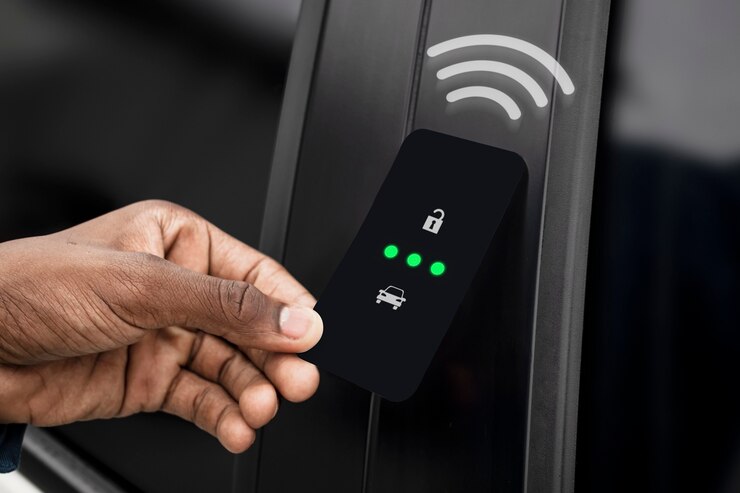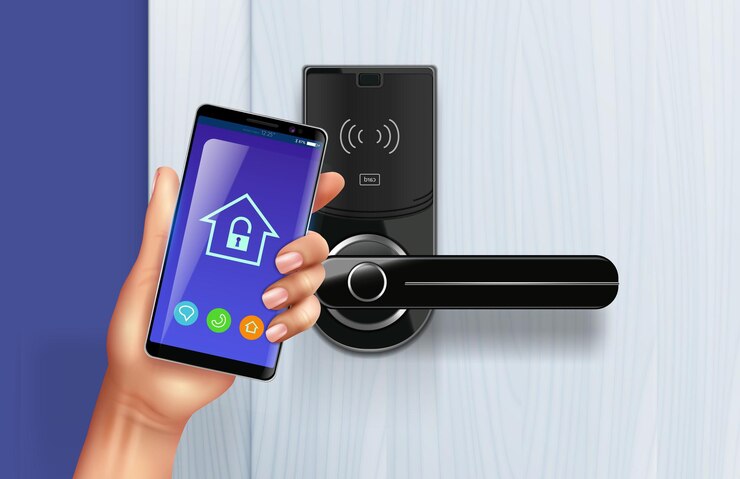Wireless lock Access control systems provide secure and convenient entry to buildings and facilities. These systems use wireless technology to manage and monitor access, offering flexibility and enhanced security.
Modern businesses and organizations are increasingly turning to wireless locks access control systems to improve their security measures. These systems use wireless technology to allow authorized individuals access to buildings and facilities, while also offering real-time monitoring and reporting capabilities.
With the convenience and security benefits they provide, wireless locks access control systems are becoming a popular choice for enhancing access management in various sectors, including commercial and residential properties, educational institutions, and healthcare facilities. This article explores the key features and advantages of wireless locks access control systems, as well as their potential impact on improving overall security and access control measures.

Evolution Of Wireless Lock Access Control Systems
Access control systems have evolved significantly, with wireless locks becoming a prominent feature. These systems provide convenient and flexible security solutions, allowing for seamless integration with existing infrastructure and improved access management. The wireless nature of these locks eliminates the need for complex wiring, offering enhanced accessibility and control.
The Evolution of Access Control Systems
Access control systems have evolved significantly over the years, transitioning from traditional mechanical locks to advanced wireless locks access control technologies. The need for enhanced security, convenience, and flexibility has driven this evolution, leading to the development of innovative access control solutions.
Traditional Locks Vs. Wireless Locks
Traditional Locks:
– Reliance on physical keys.
– Limited control and monitoring capabilities.
– Susceptible to unauthorized duplication of keys.
– Manual operation for entry and exit.
Wireless Locks Access Control:
– Utilizes wireless communication for seamless connectivity.
– Integration with smart devices for remote access and management.
– Enhanced security features such as biometric authentication and encryption.
– Real-time monitoring and audit trails for comprehensive access control.
Advantages Of Wireless Locks Access Control
The adoption of wireless locks access control offers numerous advantages, including:
– Enhanced Security: Advanced encryption and authentication mechanisms provide a higher level of security compared to traditional locks.
– Convenience: Remote access and management capabilities enable seamless operation and monitoring from any location.
– Scalability: Wireless access control systems can be easily expanded and reconfigured to accommodate changing security requirements.
– Cost-Efficiency: Reduced reliance on physical keys and streamlined maintenance result in cost savings over time.
– Integration: Seamless integration with existing security and automation systems for enhanced overall functionality.
– Improved User Experience: User-friendly interfaces and mobile applications offer a more intuitive and convenient experience for users.
The evolution of access control systems from traditional locks to wireless access control technologies has revolutionized the way security is managed and maintained. With advanced features and seamless connectivity, wireless locks access control systems have become an essential component of modern security infrastructure.
Integration Of Wireless Locks Access Control In Smart Buildings
Smart buildings are rapidly becoming the epitome of modern living, offering convenience, efficiency, and enhanced security. The integration of wireless locks access control systems plays a pivotal role in transforming traditional buildings into smart, interconnected spaces. This innovation offers seamless, secure, and flexible access management, bolstering the overall functionality and security of modern buildings.
Enhancing Security Measures
Implementing wireless locks access control in smart buildings elevates security measures to a sophisticated level. Wireless locks equipped with advanced encryption protocols and multi-factor authentication provide a formidable defense against unauthorized access attempts. Additionally, real-time monitoring and audit trails enable quick identification of security breaches, enhancing incident response capabilities.

Streamlining Access Management
The integration of wireless locks access control in smart buildings streamlines access management processes. Access rights can be efficiently managed and updated remotely, eliminating the need for manual rekeying or physical key distribution. Wireless access control systems offer the versatility to create temporary access permissions for visitors or manage access levels based on predefined schedules, ensuring precise control over the building’s access points.
Innovative Features Of Wireless Locks Access Control
When it comes to access control systems, wireless locks have revolutionized the way we secure and manage our properties. These innovative devices offer a myriad of features that make them a practical and efficient choice for both residential and commercial purposes. From cutting-edge biometric authentication to remote access capabilities, wireless locks are continuously evolving to provide advanced security solutions.
Biometric Authentication
One of the standout features of wireless locks access control is their advanced biometric authentication technology. By utilizing fingerprint or facial recognition, these locks eliminate the need for traditional keys or access cards, providing a highly secure and convenient method for granting access. This not only enhances security but also streamlines the entry process, making it ideal for high-security areas or organizations requiring strict access controls.
Remote Access Capabilities
With the advancement of wireless technology, these locks offer remote access capabilities, allowing users to manage access control from anywhere with an internet connection. Whether it’s granting temporary access to visitors, monitoring entry logs, or remotely locking and unlocking doors, this feature provides unparalleled flexibility and convenience for property owners and administrators. This remote control functionality also enables real-time access management, making it easier to respond to security incidents or changing access needs.
Implementation Challenges And Solutions
When it comes to implementing wireless locks for access control, some challenges may arise, but there are effective solutions to address them. Navigating through these challenges ensures a seamless implementation, delivering a secure and efficient access control system.
Interference And Signal Range
One of the primary implementation challenges with wireless locks access control is interference and limited signal range. Wireless signals can be disrupted by various factors such as physical obstacles, electronic devices, or other wireless networks in the vicinity. This interference can impact the stability and reliability of the access control system.
Data Security Measures
In the digital age, ensuring robust data security measures is imperative for wireless locks access control systems. The transmission of data between wireless locks and control devices should be safeguarded against unauthorized access and potential breaches.
Future Trends In Wireless Locks Access Control
With the increasing need for secure and convenient access control solutions, the future of wireless locks access control is evolving rapidly. As technology continues to advance, several emerging trends are shaping the industry. Internet of Things (IoT) integration and advancements in mobile access technologies are key areas driving innovation in this field.
Internet Of Things (iot) Integration
The integration of wireless locks with the Internet of Things (IoT) is transforming access control systems. IoT integration allows for enhanced connectivity and interoperability between devices, enabling seamless management and monitoring of access control systems over a network. Through IoT, wireless locks can be integrated with other smart devices and systems, providing a more cohesive and efficient security infrastructure.
Advancements In Mobile Access Technologies
Advancements in mobile access technologies are redefining the way in which access control is managed. Mobile access solutions are becoming increasingly prevalent, allowing users to control and manage access to wireless locks using their smartphones. This not only provides greater convenience but also enhances security by enabling features such as remote access management, real-time monitoring, and digital key issuance.
Frequently Asked Questions On Wireless Locks Access Control
What Are The Benefits Of Wireless Locks Access Control Systems?
Wireless locks access control systems offer enhanced security, convenience, and flexibility. They allow for remote access management, eliminate the need for physical keys, and provide detailed access logs for better monitoring.
How Do Wireless Locks Access Control Systems Work?
Wireless locks access control systems use wireless technology to authenticate and grant access to authorized individuals. These systems utilize secure communication protocols and can be managed through a centralized control panel, enabling efficient access management.
Are Wireless Locks Access Control Systems Easy To Install?
Yes, wireless locks access control systems are relatively easy to install compared to traditional wired systems. They require minimal wiring and can often be integrated into existing infrastructure, making the installation process efficient and cost-effective.
Conclusion
Wireless locks access control systems offer convenience and security for both residential and commercial properties. With the latest technology, users can easily manage access permissions and monitor entry points from anywhere. Investing in a reliable wireless lock system can enhance the overall safety and efficiency of any property.

